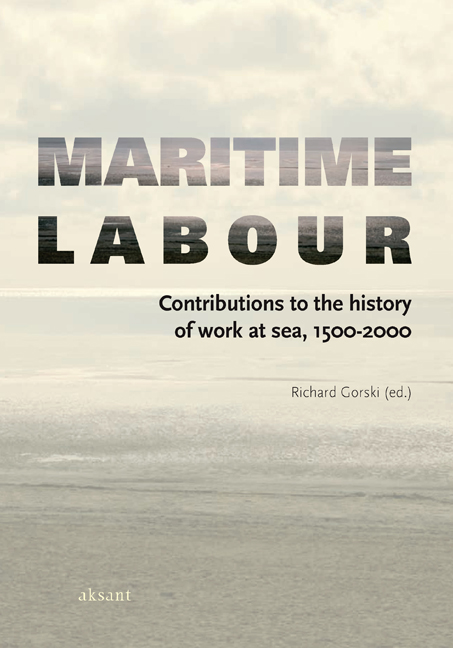Book contents
- Frontmatter
- Contents
- Introduction
- Six Cross-sections of the Dutch Maritime Labour Market: A Preliminary Reconstruction and its Implications (1610-1850)
- On Maritime Labour and Maritime Labour Markets in Germany, 1700-1900
- Swedish Naval Personnel in the Merchant Marine and in Foreign Naval Service in the Eighteenth Century
- Quantifying British Seafarers, 1789-1828
- ‘But for the Loves of the Fishes’: Maritime Labour and Ecological Culture in Nineteenth-century Newfoundland
- The Shipping Federation and the Free Labour Movement: A Comparative Study of Waterfront and Maritime Industrial Relations, c.1889-1891
- Health and Safety Aboard British Merchant Ships: The Case of First Aid Instruction, 1881-1908
- British Merchant Marine Engineer Licensing, 1865-1925
- Transatlantic Fishers: New England and British Trawlermen, 1960-1972
- Masters and chiefs: Enabling globalization, 1975-1995
- About the Contributors
Six Cross-sections of the Dutch Maritime Labour Market: A Preliminary Reconstruction and its Implications (1610-1850)
Published online by Cambridge University Press: 26 January 2021
- Frontmatter
- Contents
- Introduction
- Six Cross-sections of the Dutch Maritime Labour Market: A Preliminary Reconstruction and its Implications (1610-1850)
- On Maritime Labour and Maritime Labour Markets in Germany, 1700-1900
- Swedish Naval Personnel in the Merchant Marine and in Foreign Naval Service in the Eighteenth Century
- Quantifying British Seafarers, 1789-1828
- ‘But for the Loves of the Fishes’: Maritime Labour and Ecological Culture in Nineteenth-century Newfoundland
- The Shipping Federation and the Free Labour Movement: A Comparative Study of Waterfront and Maritime Industrial Relations, c.1889-1891
- Health and Safety Aboard British Merchant Ships: The Case of First Aid Instruction, 1881-1908
- British Merchant Marine Engineer Licensing, 1865-1925
- Transatlantic Fishers: New England and British Trawlermen, 1960-1972
- Masters and chiefs: Enabling globalization, 1975-1995
- About the Contributors
Summary
Introduction
An examination of the maritime labour market of the Dutch Republic, its prehistory and its aftermath, does not seem to need a defence. Nevertheless, it is good to briefly lay out where our main interests lie. Recently the success of the Dutch Republic has been explained in the framework of an ‘upscaling’ of centres in leadership in Europe during the early modern period. Starting in the city-states in northern Italy in the late middle ages the centre shifted – via the Southern Netherlands – to the Dutch Republic, and then in the eighteenth century to Britain. Only from the eighteenth century onwards were large territorial states able to mobilize effectively the potential of their populations. Before this the allocation of resources in the small political urban entities was relatively more effective.
Logically, the next question is why the Low Countries were so well-placed to be able to take over this leadership for more than a century, which raises questions about the nature of Dutch society before it became, in the celebrated phrase of Sir William Temple, ‘the fear of some, the envy of others and the wonder of all their neighbours’. The provisional outcome of the debate on the preconditions for Dutch success is – according to historians like Jan Luiten van Zanden and Bas van Bavel – the early emergence of factor markets, including labour markets, in the late middle ages; or to put it differently and perhaps in an old-fashioned way, early commodification or the early rise of capitalism. As to the demise of the Republic, like its precursor Venice and its successor Britain, loss of leadership did not invariably imply rapid decline in an absolute sense. Dutch economic decline was relative rather than absolute in nature before the last decades of the eighteenth century.
The engine of success, and later decline, was self-evidently the Dutch economy. It is an economy that has been characterized in many historical overviews of the Low Countries as maritime and colonial, though there are alternatives to this prevailing picture. In particular Jan de Vries has shown the importance of agricultural specialization and an efficient network of internal transportation.
- Type
- Chapter
- Information
- Maritime LabourContributions to the History of Work at Sea, 1500–2000, pp. 13 - 42Publisher: Amsterdam University PressPrint publication year: 2008



